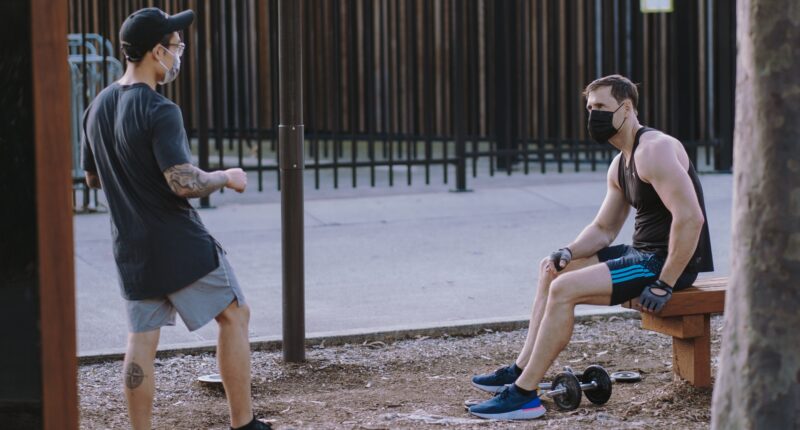According to a recent study published by the University of Glasgow, a new contact tracing app that relies on blockchain technology could help to win public trust in the COVID19 fight.
Contact Tracing App Built with Blockchain Technology
The University of Glasgow study was published in the IEEE Internet of Things Journal. It outlines how trust could be built into a contact tracing system that is imbued with the unique properties of the blockchain.
Track and trace apps could prove pivotal in the fight against COVID19. Traditionally, track-and-trace entails medical personnel contacting each infected person. That method is effective but time-intensive. Besides that, it relies on the ability of the infected to remember everyone they encountered with. An app that can map how infected people interact with others could be more accurate and speed up the process.
One example of a contact-tracing app is the TraceTogether system used in Singapore to track down potentially infected people. The app relies on Bluetooth technology to determine a person’s interactions if they were found to be infected. The data is sent to contact tracers, who then reach out to potentially infected people and asked them to self-isolate.
Tech giants Google and Apple have been working with governments globally to work on similar systems. However, these tracking systems have raised concerns about the protection of personal data.
A Solution for Data Security by the University of Glasgow
The University of Glasgow researchers are proposing a contact-tracing mobile-based system called BeepTrace. It relies on the unique properties of the blockchain to create a decentralized system that could potentially be international to help end the transmission of the virus.
According to Dr.Lei Zhang from the University of Glasgow’s James Watt School of engineering, who is the lead academic author of the paper, one of the main benefits of the blockchain is the lack of centralized control. He noted that data from users of the system would be stored on a tamper-proof digital ledger that could be accessed by the person with a unique digital signature.
He added that each user would hold a copy of the ledger locally in that blockchain network, which would ensure that the data was consistent and accessible. Besides that, every change to the network would need to be verified via a consensus mechanism.
Contact Tracing With BeepTRace
A limited number of volunteers within the University of Glasgow campus are currently testing BeepTrace as a smartphone app. After this year, they are planning to expand the system to a wider test base. The system ensures user privacy is protected since their data is stored in the blockchain.
Every user is given a randomly generated anonymous ID. The ID changes often to prevent identification or tracking of a person. If they are tested for COVID19, the healthcare provider records the infections on the blockchain using all ID’s stored on the BeepTrace app in the last 14 days. Anyone with the app who had been in contact with the infected will be notified immediately.
Since only the healthcare provider or approved apps can update data to the blockchain, there is little risk of misinformation being spread using the system.
The app can trace down potentially infected people in either the active or the passive mode. In the passive mode, it relies on encrypted GPS data that is uploaded to the blockchain and sent to a central server to calculate possible contacts. In the active mode, the app uses Bluetooth technology, which works when two people are close to each other.
The team’s paper on passive tracing has already been published. They plan to publish the paper on passive tracing titled ‘Privacy-Preserving Contact Tracing and Public Risk Assessment using Blockchain for COVID-19 Pandemic’ which will be published in the next edition of the IEEE Internet of Things Magazine.
The use of blockchain-based contact tracing is a concept that is already being used in various places around the world on a small scale. For instance, South Korea’s Jeju Island has a blockchain-based contact tracing app. ShareRing has also launched its blockchain-powered contact-tracing app. The recently published University of Glasgow study shows that there is a lot of research going on to harness the benefit of the blockchain in preserving privacy. With many people predicting a 2nd wave of Coronavirus, monetizing the contact tracing industry could be one of the most beneficial tools moving forward. Additionally, similar protocols can be put in place to mitigate the risks involved in future pandemics.
Notice: Information contained herein is not and should not be construed as an offer, solicitation, or recommendation to buy or sell securities. The information has been obtained from sources we believe to be reliable; however no guarantee is made or implied with respect to its accuracy, timeliness, or completeness. Authors may own the crypto currency they discuss. The information and content are subject to change without notice. Visionary Financial and its affiliates do not provide investment, tax, legal or accounting advice. This material has been prepared for informational purposes only and is the opinion of the author, and is not intended to provide, and should not be relied on for, investment, tax, legal, accounting advice. You should consult your own investment, tax, legal and accounting advisors before engaging in any transaction. All content published by Visionary Financial is not an endorsement whatsoever. Visionary Financial was not compensated to submit this article Please also visit our Privacy policy; disclaimer; and terms and conditions page for further information.

